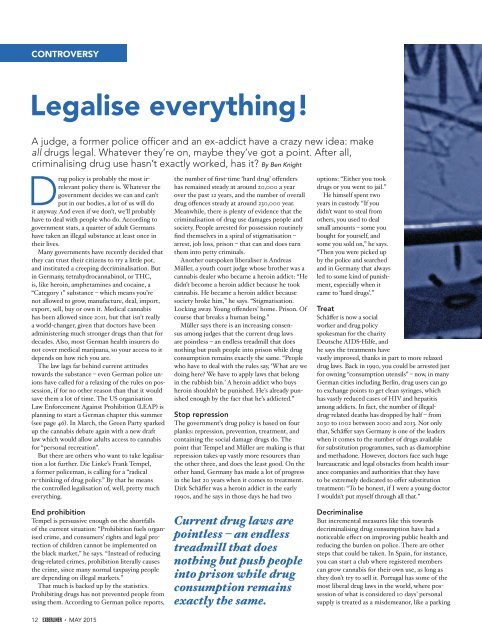You also want an ePaper? Increase the reach of your titles
YUMPU automatically turns print PDFs into web optimized ePapers that Google loves.
CONTROVERSY<br />
Legalise everything!<br />
A judge, a former police officer and an ex-addict have a crazy new idea: make<br />
all drugs legal. Whatever they’re on, maybe they’ve got a point. After all,<br />
criminalising drug use hasn’t exactly worked, has it? By Ben Knight<br />
Drug policy is probably the most irrelevant<br />
policy there is. Whatever the<br />
government decides we can and can't<br />
put in our bodies, a lot of us will do<br />
it anyway. And even if we don’t, we’ll probably<br />
have to deal with people who do. According to<br />
government stats, a quarter of adult Germans<br />
have taken an illegal substance at least once in<br />
their lives.<br />
Many governments have recently decided that<br />
they can trust their citizens to try a little pot,<br />
and instituted a creeping decriminalisation. But<br />
in Germany, tetrahydrocannabinol, or THC,<br />
is, like heroin, amphetamines and cocaine, a<br />
“Category 1” substance – which means you’re<br />
not allowed to grow, manufacture, deal, import,<br />
export, sell, buy or own it. Medical cannabis<br />
has been allowed since 2011, but that isn't really<br />
a world-changer, given that doctors have been<br />
administering much stronger drugs than that for<br />
decades. Also, most German health insurers do<br />
not cover medical marijuana, so your access to it<br />
depends on how rich you are.<br />
The law lags far behind current attitudes<br />
towards the substance – even German police unions<br />
have called for a relaxing of the rules on possession,<br />
if for no other reason than that it would<br />
save them a lot of time. The US organisation<br />
Law Enforcement Against Prohibition (LEAP) is<br />
planning to start a German chapter this summer<br />
(see page 46). In March, the Green Party sparked<br />
up the cannabis debate again with a new draft<br />
law which would allow adults access to cannabis<br />
for “personal recreation”.<br />
But there are others who want to take legalisation<br />
a lot further. Die Linke’s Frank Tempel,<br />
a former policeman, is calling for a “radical<br />
re-thinking of drug policy.” By that he means<br />
the controlled legalisation of, well, pretty much<br />
everything.<br />
End prohibition<br />
Tempel is persuasive enough on the shortfalls<br />
of the current situation: “Prohibition fuels organised<br />
crime, and consumers’ rights and legal protection<br />
of children cannot be implemented on<br />
the black market,” he says. “Instead of reducing<br />
drug-related crimes, prohibition literally causes<br />
the crime, since many normal taxpaying people<br />
are depending on illegal markets.”<br />
That much is backed up by the statistics.<br />
Prohibiting drugs has not prevented people from<br />
using them. According to German police reports,<br />
12 • MAY <strong>2015</strong><br />
the number of first-time ‘hard drug’ offenders<br />
has remained steady at around 20,000 a year<br />
over the past 12 years, and the number of overall<br />
drug offences steady at around 230,000 year.<br />
Meanwhile, there is plenty of evidence that the<br />
criminalisation of drug use damages people and<br />
society. People arrested for possession routinely<br />
find themselves in a spiral of stigmatisation –<br />
arrest, job loss, prison – that can and does turn<br />
them into petty criminals.<br />
Another outspoken liberaliser is Andreas<br />
Müller, a youth court judge whose brother was a<br />
cannabis dealer who became a heroin addict: “He<br />
didn’t become a heroin addict because he took<br />
cannabis. He became a heroin addict because<br />
society broke him,” he says. “Stigmatisation.<br />
Locking away. Young offenders’ home. Prison. Of<br />
course that breaks a human being.”<br />
Müller says there is an increasing consensus<br />
among judges that the current drug laws<br />
are pointless – an endless treadmill that does<br />
nothing but push people into prison while drug<br />
consumption remains exactly the same. “People<br />
who have to deal with the rules say, ‘What are we<br />
doing here? We have to apply laws that belong<br />
in the rubbish bin.’ A heroin addict who buys<br />
heroin shouldn’t be punished. He's already punished<br />
enough by the fact that he’s addicted.”<br />
Stop repression<br />
The government’s drug policy is based on four<br />
planks: repression, prevention, treatment, and<br />
containing the social damage drugs do. The<br />
point that Tempel and Müller are making is that<br />
repression takes up vastly more resources than<br />
the other three, and does the least good. On the<br />
other hand, Germany has made a lot of progress<br />
in the last 20 years when it comes to treatment.<br />
Dirk Schäffer was a heroin addict in the early<br />
1990s, and he says in those days he had two<br />
Current drug laws are<br />
pointless – an endless<br />
treadmill that does<br />
nothing but push people<br />
into prison while drug<br />
consumption remains<br />
exactly the same.<br />
options: “Either you took<br />
drugs or you went to jail.”<br />
He himself spent two<br />
years in custody. “If you<br />
didn't want to steal from<br />
others, you used to deal<br />
small amounts – some you<br />
bought for yourself, and<br />
some you sold on,” he says.<br />
“Then you were picked up<br />
by the police and searched<br />
and in Germany that always<br />
led to some kind of punishment,<br />
especially when it<br />
came to ‘hard drugs’.”<br />
Treat<br />
Schäffer is now a social<br />
worker and drug policy<br />
spokesman for the charity<br />
Deutsche AIDS-Hilfe, and<br />
he says the treatments have<br />
vastly improved, thanks in part to more relaxed<br />
drug laws. Back in 1990, you could be arrested just<br />
for owning “consumption utensils” – now, in many<br />
German cities including Berlin, drug users can go<br />
to exchange points to get clean syringes, which<br />
has vastly reduced cases of HIV and hepatitis<br />
among addicts. In fact, the number of illegaldrug-related<br />
deaths has dropped by half – from<br />
2030 to 1002 between 2000 and 2013. Not only<br />
that, Schäffer says Germany is one of the leaders<br />
when it comes to the number of drugs available<br />
for substitution programmes, such as diamorphine<br />
and methadone. However, doctors face such huge<br />
bureaucratic and legal obstacles from health insurance<br />
companies and authorities that they have<br />
to be extremely dedicated to offer substitution<br />
treatment: “To be honest, if I were a young doctor<br />
I wouldn't put myself through all that.”<br />
Decriminalise<br />
But incremental measures like this towards<br />
decriminalising drug consumption have had a<br />
noticeable effect on improving public health and<br />
reducing the burden on police. There are other<br />
steps that could be taken. In Spain, for instance,<br />
you can start a club where registered members<br />
can grow cannabis for their own use, as long as<br />
they don’t try to sell it. Portugal has some of the<br />
most liberal drug laws in the world, where possession<br />
of what is considered 10 days’ personal<br />
supply is treated as a misdemeanor, like a parking


















